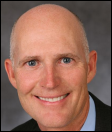"The US Immigration and Customs Enforcement (ICE) posts an anticipated future contracting opportunity for a correctional EHR for ICE detainees,…
Monday Morning Update 6/1/15
Top News
A judge approves an injunction requested by Dallas-based telemedicine provider Teladoc against the Texas Medical Board for its new rule that requires doctors to conduct a face-to-face patient visit before issuing a prescription.
Reader Comments
From Talking About BS: “Re: Athenahealth. Has spent almost $1 million on lobbying so far in 2014-15 and VP Dan Haley is listed in OpenSecrets.org as a ‘revolving door’ lobbyist, described as federal employees turned lobbyists and vice versa. Athena’s cloud vapor simply isn’t selling to real customers and instead is being sold to Wall Street and Congress. Einhorn has this company pegged.”
From Travlinman: “Re: Epic. Guarantees ongoing interoperability with TeleTracking. Are they going to start playing nice with other vendors?”
HIStalk Announcements and Requests

More than half of poll respondents think Cerner is the HIT stock to buy. New poll to your right or here: who is most to blame for lack of patient data sharing among providers? Vote and then click the poll’s comments link to make your case.

I have no idea what a Rekenrek is, but Ms. S says her Indiana first graders are using the ones we bought via our DonorsChoose project daily for Math Warm-Up, adding that, “We had been using Rekenreks that we made on our own that are falling apart, so to see professionally made ones is wonderful!”
I seem to be especially cranky about grammar these days, so add these to my already long list: (a) starting sentences with the word “So” like a drunken bar patron launching into a long, dull anecdote; (b) sloppy use of geographic terms such as “a German doctor” that could mean a doctor from Germany, a doctor in Germany, or both; (c) using “less” rather than “fewer” in describing a collection of individual items, as in erroneously stating, “The event had less people than before”; (d) confusing “I” with “me” as in incorrectly proclaiming, “My brother came to visit Mary and I.” There, now I feel better.
I’m also annoyed by the expression “EHR mandates.” Nobody requires doctors to use EHRs except perhaps their employers – they just pay them extra if they do.
Last Week’s Most Interesting News
- HHS names Susannah Fox as its new CTO.
- Two entrepreneurs who sold DiagnosisOne to Alere in 2012 buy back the business – now known as Alere Analyics – to form Persivia.
- Athenahealth VP of Government and Regulatory Affairs Dan Haley said in a New York Times article titled “Tech Rivalries Impede Digital Medical Record Sharing” that customers typically pay EHR vendors $1 million upfront, $500,000 per year, and $2 per patient record to exchange information with other systems.
- Forbes names Epic CEO Judy Faulkner as the wealthiest women in all of technology with an estimated $2.6 billion net worth.
- Cerner told shareholders that it recorded $4.25 billion in sales for 2014.
Webinars
June 9 (Tuesday) 11:30 ET. “Successful HIEs DO Exist: Best Practices for Care Coordination.” Sponsored by Medicity. Presenters: Dan Paoletti, CEO, Ohio Health Information Partnership; Brian Ahier, director of standards and government affairs, Medicity. Not all HIEs are dead – some, like Ohio’s CliniSync HIE, are evolving and forging a new path to successful care coordination. Brian Ahier will explain how HIEs can help providers move to value-based care models, emphasizing Meaningful Use Stage 3 and FHIR. Dan Paoletti will provide best practices in describing CliniSync’s journey to success in serving 6,000 primary care physicians, 141 hospitals, and and 290 long-term and post-acute care facilities. Attendees will learn how to use a phased approach, establish client champions, help providers meet MU Stage 2, create a provider email directory, deliver care coordination tools, and drive continued ROI.
People

Tim Theriault, global CIO of Walgreens Boots Alliance (the former Walgreen), resigns for personal reasons. He will be replaced by Anthony Roberts, SVP/international CIO. Roberts came on board with the December 2014 Boots acquisition.

Former Meriter CIO Peter Strombom died May 18 at his home in Costa Rica. He was 75.


Jeremy Delinsky, chief product officer at Athenahealth, resigns after five months in the position to take a CTO position with an online furniture company. ATHN shares dropped more than 5 percent Friday following the announcement. His interim replacement will be VP Kyle Armbrester. ATHN shares are down 20 percent so far in 2015.
Announcements and Implementations
Athenahealth offers athenaCommunicator Enterprise to new customers who participate in an ACO for a flat 10 percent of their MSSP shared savings payouts.
Government and Politics

Florida Governor Rick Scott, former CEO of for-profit and fraud-admitting Columbia/HCA, wants to hold the state’s non-profit hospitals more accountable for their huge profits, topped by Lee Memorial Health System’s $230 million.
Ashish Jha of Harvard tweeted out rave comments about Doc Stats, an app that shows the approximate number of procedures a doctor performs as derived from CMS data.

A Bay Area recycling firm is looking for a woman who dropped off garage junk following her husband’s death that included an Apple I computer, one of only 200 that were hand built by Steve Jobs and Steve Wozniak in 1976. The company wants to give the woman $100,000, her half of the amount a private collector paid to buy it from them.
Other
AMIA’s EHR 2020 task force publishes its recommendations. Many of them are observations of the current state or non-specific ideas about long-term changes that I didn’t find especially compelling or novel, but a few actionable items are:
- Use natural language processing to convert free text notes to discrete data and reduce reliance on documentation templates.
- Spend government money to study data entry methods and encourage the use of those that improve provider efficiency.
- Slow down or freeze the Meaningful Use and certification requirements.
- Eliminate requirements for providers to enter EHR information that isn’t used for direct patient benefit.
- Eliminate E&M codes and checkbox-driven data entry that fails to capture the patient’s voice.
- Allow vendors to meet MU certification with less-prescriptive methods and require them to post video recordings of their system so that EHR purchasers can see how they work.
- Create the national Health IT Safety Center.
- Require vendors to offer APIs to earn certification.
The board of Erlanger Health System (TN) approves its $91 million Epic contract, which will also require $97 million in maintenance costs over the next 10 years. The CFO says Epic beat Cerner on price and the selection committee preferred Epic 28 votes to two.
The Indianapolis business paper profiles ICUcare, which puzzling offers both a smartcard-based PHR (the company owner says he spent $25 million to develop it) and a telemedicine platform. The owner says the company has 12 employees and $3.5 million in revenue, some of which should probably be directed to updating the website, whish announces plans to release new technology in June 2010 and that lists Windows Vista as the required operating system (those are just the tip of the “ice-burg,” it says).
A Florida hospital tests the Internet lag time in performing telesurgery using the da Vinci surgical robot, finding that surgeons can’t tell the difference whether they are a few feet or a few states away from the patient.

Influential healthcare IT expert Jess Jacobs of Aetna’s Innovation Labs recounts her recent and current experiences (with photos) as an inpatient of a hospital that can’t do anything right – a bathroom sink clogged for three days with her roommate’s bloody vomit, having to use her own cellphone to coordinate the work of several attending doctors who hadn’t talked to each other, mixing up mouthwash with handwash, a nurse call system that didn’t work, the nursing staff’s disregard of her roommates sickle cell crisis pain, and the barring of her patient advocate (who is a medical student at the same organization) from participating in her care. She complained to hospital administration after an earlier visit and received a halfhearted apology blaming her being housed in a treatment room as due to unplanned admissions, an acknowledgment that it was “unfortunate” that the hospital didn’t allow her friend to serve as her patient advocate (without offering an explanation as to why), and defense of her roommate’s pain management as being appropriate based on medical evidence. She’s back in as an inpatient for intractable vomiting and says nothing has improved – the hospital missed her abnormal lab results, security guards confiscated her prescribed drugs and supplies and threatened to arrest her for objecting, and the hospital assigned a “sitter” who sleeps, talks loudly in the hall, and eats bacon in her room. The scary thing about her story is that it’s not unusual from my experience – everybody who lives through an inpatient stay can relate equally horrifying stories about the incompetence and indifference they encountered.
A good article in IEEE Spectrum describes how BIDMC CIO (and gentleman farmer) John Halamka, MD helped develop early big data platforms I2B2 and SHRINE that later may have saved his wife’s life as he researched the best treatment options for her newly diagnosed cancer based on historical outcomes. He adds in describing future innovation, “All these big companies are fine, but do we really think the next cool innovation is going to come out of an 8,000-person company? No. It’s probably a two-person garage operation.”
Another interesting IEEE Spectrum article addresses the healthcare uses of IBM’s Watson, which it concludes isn’t ready for prime time and may not be for some time because: (a) it not only has to find existing answers in existing content but also has be trained to think like a doctor; (b) journal articles Watson uses as source material aren’t always current or based on actual medical practice; (c) EHR databases are full of errors and focus more on billing rather than clinical usefulness. The article mentions other companies working on medical artificial intelligence such as QPID, DXplain, and CancerLinQ.
A small study of Facebook users finds that those with low self-esteem post often about their romantic partners, while those who brag about diet, exercise, and achievements are often narcissists who crave “likes” and positive comments from annoyed “friends” just trying to be nice.
Sponsor Updates
- Medicity posts “ICD-10: Are We There Yet?”
- MedData will exhibit at the Coastal Emergency Medicine Conference June 5-6 in South Carolina.
- First Databank customer Joshua Schmees, PharmD of Hospital Sisters Health System describes the organization’s success in reducing alert fatigue by using FDB’s AlertSpace.
- Quest Diagnostics employees raise over $11,000 in the American Cancer Society’s Relay for Life.
- WeiserMazars posts pictures from its nationwide community service day.
- NTT Data offers “Predictive Intelligence Brings Increased Value to Data.”
- Versus Technology will exhibit at AAMI 2015 June 5-8 in Denver.
- Truven Health Analytics posts “Understanding Your Exchange Population: Are You Asking the Right Questions?”
- Microsoft summarizes the origins of Oneview Healthcare as part of its Customer Stories series.
- Orion Health and Passport Health will exhibit at AHIP Institute 2015 June 3-5 in Nashville.
- Patientco offers “Out-of-Pocket Costs are Increasing Faster Than Expected.”
- PatientPay Founder and CEO Tom Furr asks “What Would Steve Jobs Say?”
- ZirMed posts “Leveraging Data Analytics, Keeping Up with Value-Based Care, and Rev Cycle Success at Stanford Children’s Health.”
- PMD offers “Reusing Code to Improve Care Coordination.”
- Wide River will host an educational event, Health IT: Compliance & Innovation, June 4 in Lincoln, NE.
- Sagacious Consultants posts “What You Don’t Know Can Hurt You: the Importance of Measuring Productivity.”
- Huron Consulting will sponsor the 2015 Aria Health Golf Classic June 1 in support of Philadelphia-based Aria Health’s ICU renovations.
- The Nashville Business Journal features Shareable Ink CEO Hal Andrews in its “The Boss” video series.
- Streamline Health will exhibit at the 2015 CHIA Convention & Exhibit June 8-10 in Palm Springs, CA.
- T-System will exhibit at NYHIMA’s 2015 Annual Conference June 7-10 in Syracuse, NY.
- TeleTracking offers “Making Interoperability a Commonplace.”
- Valence Health Project Manager Jacob Krive will present a session on big data and population health at the University of Illinois College of Medicine Chicago June 3.
- Verisk Health, West Corp., and ZeOmega will exhibit at the AHIP 2015 Institute June 3-5 in Nashville.
- Voalte offers a new blog showcasing the successful deployment of its smartphone solution at Massachusetts General Hospital.
- Winthrop Resources will exhibit at the NY Tech Summit June 4-5 in Verona.
- Xerox offers “The Best Kept Secret in Healthcare.”
Contacts
Mr. H, Lorre, Jennifer, Dr. Jayne, Dr. Gregg, Lt. Dan.
More news: HIStalk Practice, HIStalk Connect.
Get HIStalk updates.
Contact us online.







The AP Stylebook change of stance on the use of ‘more’ versus ‘over’ hits my grammar cranky button. i suspect too many people just couldn’t get it right so they dumbed it down to say either word works in any circumstance. Following the announcement someone tweeted ‘More than my dead body…’ That summarizes it nicely!
Wow, it takes a thief, doesn’t it?
I don’t discount IBMWatson’s capabilities of fast research and queries at all and Congress could use an install by all means to help them make laws, said that a few years ago, but how come we never hear about what IBMWatson is doing for Citigroup:) They bought an install and never mind the fact that the data scientist who created IBMWatson left almost two years ago to model math and numbers to create profits at a hedge fund:) Everything in due time I suppose:)
http://ducknetweb.blogspot.com/2014/06/ibm-computer-scientist-leaves-ibm.html
Dan Haley has demonstrated a lack of integrity and a wonderful talent for hyperbole.
Who from athena will stand accountable for their wild assertions?
When will athena leadership learn that healthcare professionals are smart people who don’t fall for hyperbole and innuendo.
It erodes their already diminishing credibility in an industry of some of the nations smartest people.
I’m one reader who applauds your grammar crankiness, Mr H. When my grammar crankiness reaches its limit, I pull out my black Sharpie and correct public signs in stores, banks, and, yes, hospitals.
I think you mean, “The Indianapolis business paper profiles ICUcare, which *puzzlingly*offers both a smartcard-based PHR…”
I agree with all your examples of grammar crankiness and would like to add one more. Perhaps this is more spelling than grammar, but I can’t understand why people feel they must use an apostrophe when they add an “s” for the plural of a noun.
BTW, one of my kids once called me from a grocery store to let me know that that particular store’s express line sign actually read “10 items or fewer.”
Re: Grammar crankiness. Subject vs object pronoun covered in amazing / exhaustive / hysterical detail by Law Society of Saskatchewan Library, featuring references to lyrics of Lady Gaga and One Direction : https://lsslib.wordpress.com/2014/06/04/tips-from-the-editor-you-and-i-vs-you-and-me/
Agree with your grammar issues. In addition to the unlimited use of apostrophes anytime there is an “s” at the end of a word as one commenter mentioned above, and your note of the grating “So” as the first word of a response – the one that grinds me is the misuse of “myself”, when the word “me” is the correct choice about 95% of the time. Such as: “The report will be presented by Robert and myself.” Eccch! It has almost become an affected way of speaking – I guess it makes people think they sound edumucated. I think I’ll get myself a drink.